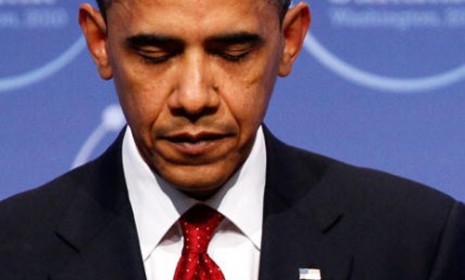What Obama's nuclear summit achieved: 5 theories
Leaders and diplomats from 47 countries gathered in Washington this week to forge a unified nuclear policy. What did (or didn't) they accomplish?

President Obama's nuclear security summit concluded Tuesday night, after two days of meetings among leaders and diplomats from 47 countries. The Obama administration hails the summit as a success, saying it made the world a safer place. But the summit's aims were so "modest and uncontroversial," says Tony Karon at Time, it was almost automatically "a success." (Watch a CBS report about the nuclear summit's achievements.) Here, 5 noteworthy outcomes from the gathering:
It cut the worldwide stock of nuclear materials
In addition to the Russian-American deal to reduce stocks of excess plutonium, countries such as the Ukraine, Chile, Mexico and Canada agreed to get rid of enriched uranium. Malaysia agreed to limit the sale of nuclear-related materials. President Obama's call to "lock up all vulnerable [nuclear] material in four years" was endorsed by all 47 participants, though any method for accomplishing that goal remains "disappointingly squishy," says the New York Times.
The Week
Escape your echo chamber. Get the facts behind the news, plus analysis from multiple perspectives.

Sign up for The Week's Free Newsletters
From our morning news briefing to a weekly Good News Newsletter, get the best of The Week delivered directly to your inbox.
From our morning news briefing to a weekly Good News Newsletter, get the best of The Week delivered directly to your inbox.
It let Iran off the hook...
"The summit did nothing to lessen the biggest state-based threat to international security today – Iran’s nuclear ambitions," says Nile Gardiner in the Daily Telegraph. While the U.S. pushed for "tough sanctions" to "choke off investment in Iran's energy sector," says Tony Karon at Time, neither China nor Russia played ball. While both agreed to further talks on sanctioning Iran, an agreement to impose them is further away than ever.
... but also sent it a serious message
"The U.S. doesn't need to drive Iran into a sanctions-led economic depression," says Max Fisher at The Atlantic. "It just needs the credible threat that it could." And this summit's will-they-or-won't-they act from Russia and China provided a "tremendous deterrent to Iran's leadership," who simply cannot afford to lose business from those countries.
A free daily email with the biggest news stories of the day – and the best features from TheWeek.com
It brought nuclear terrorism into the spotlight...
Obama's warning on the risk of a nuclear attack — it has "gone up," he told leaders at the summit — sounded "genuinely scary" coming from a president who uses such dramatic language sparingly, says Michael Crowley at NPR. "Merely getting people to focus on nuclear terrorism in this way is a step forward."
... but also failed to make us safer from it
Even though the summit focused "world attention on the nuclear threat," it did not actually do much to address it, continues Crowley. Unfortunately, "high-minded calls to action" don't mean much to rogue states like Iran or North Korea. Obama and the Democrats called it a big deal, says Suzanne Fields at the Washington Times, but it's "hard to find anyone who thinks it was anything more than big talk."
-
 Saving for a down payment on a house? Here is how and where to save.
Saving for a down payment on a house? Here is how and where to save.the explainer The first step of the homebuying process can be one of the hardest
-
 Music reviews: Zach Bryan, Dry Cleaning, and Madison Beer
Music reviews: Zach Bryan, Dry Cleaning, and Madison BeerFeature “With Heaven on Top,” “Secret Love,” and “Locket”
-
 Book reviews: ‘The Mattering Instinct: How Our Deepest Longing Drives and Divides Us’ and ‘Family of Spies: A World War II Story of Nazi Espionage, Betrayal, and the Secret History Behind Pearl Harbor’
Book reviews: ‘The Mattering Instinct: How Our Deepest Longing Drives and Divides Us’ and ‘Family of Spies: A World War II Story of Nazi Espionage, Betrayal, and the Secret History Behind Pearl Harbor’Feature The pursuit of ‘mattering’ and a historic, devastating family secret
-
 The billionaires’ wealth tax: a catastrophe for California?
The billionaires’ wealth tax: a catastrophe for California?Talking Point Peter Thiel and Larry Page preparing to change state residency
-
 Bari Weiss’ ‘60 Minutes’ scandal is about more than one report
Bari Weiss’ ‘60 Minutes’ scandal is about more than one reportIN THE SPOTLIGHT By blocking an approved segment on a controversial prison holding US deportees in El Salvador, the editor-in-chief of CBS News has become the main story
-
 Has Zohran Mamdani shown the Democrats how to win again?
Has Zohran Mamdani shown the Democrats how to win again?Today’s Big Question New York City mayoral election touted as victory for left-wing populists but moderate centrist wins elsewhere present more complex path for Democratic Party
-
 Millions turn out for anti-Trump ‘No Kings’ rallies
Millions turn out for anti-Trump ‘No Kings’ ralliesSpeed Read An estimated 7 million people participated, 2 million more than at the first ‘No Kings’ protest in June
-
 Ghislaine Maxwell: angling for a Trump pardon
Ghislaine Maxwell: angling for a Trump pardonTalking Point Convicted sex trafficker's testimony could shed new light on president's links to Jeffrey Epstein
-
 The last words and final moments of 40 presidents
The last words and final moments of 40 presidentsThe Explainer Some are eloquent quotes worthy of the holders of the highest office in the nation, and others... aren't
-
 The JFK files: the truth at last?
The JFK files: the truth at last?In The Spotlight More than 64,000 previously classified documents relating the 1963 assassination of John F. Kennedy have been released by the Trump administration
-
 'Seriously, not literally': how should the world take Donald Trump?
'Seriously, not literally': how should the world take Donald Trump?Today's big question White House rhetoric and reality look likely to become increasingly blurred